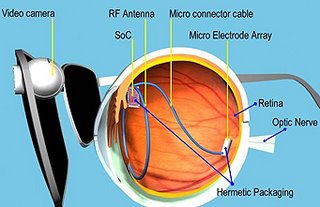 I saw a show on TV about an artificial retina. A tiny computer chip contained
I saw a show on TV about an artificial retina. A tiny computer chip contained photocells whose electrical signals stimulated the optic nerve. The blind guy could "see" light patches projected on a wall, could locate them in space, and could discriminate vertical and horizontal orientation.
What was he seeing? Electrical signals? His own brain? Surely not light, because he was blind. But he said patches of light.
What if, in the middle of the experiment, all the lights in the room were cut, leaving a totally dark room, but the computer continued to trigger the same patterns of electrical signals to the optic nerve as before. The guy should continue to see rectangles of white light, just as described before. But there would be no light in the pitch-black room. So would he be wrong in saying that he saw patches of light?
What does it mean to "see" something if no actual light is involved? If seeing only means that a certain area of the brain is active, then if I routed electrical signals from my tongue to the visual area of my brain, I should be able to see light when I suck a lemon. It's logical, but I'm not sure if I believe it.




I saw something like that on wired tv, today.
ReplyDelete...and genomes. Very interesting.